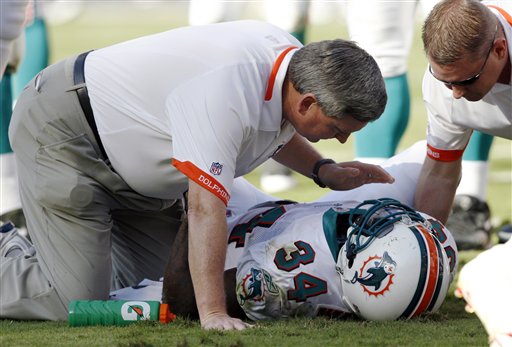Breakthrough on NFL head injuries!! Aethlon Med
Post# of 94329
Aethlon Medical's Exosome Sciences Announces the Publication of Preliminary Findings of a Blood Test to Detect Chronic Traumatic Encephalopathy (CTE) During Life
PRNewswire $AEMD
Exosome Sciences, Inc., in collaboration with majority shareholder Aethlon Medical, Inc. (AEMD) and investigators at Boston University and the University of Washington, announced today the published preliminary results of possibly the first blood test to detect the neurodegenerative disease, Chronic Traumatic Encephalopathy (CTE) during life. An early online version of these findings has been published in the Journal of Alzheimer's Disease. CTE is associated with exposure to repetitive head impacts, such as those experienced by American football players, and can only be diagnosed post-mortem at this time.

The researchers developed a method of measuring plasma exosomal tau, also referred to as a TauSome™. Exosomes are very small vesicles that are released from all types of cells throughout the body, including brain cells. They can be isolated in all body fluids, including plasma, a component of blood. Exosomes carry within them the proteins from their cells of origin. Because exosomes can cross the blood-brain-barrier (a selective barrier that separates the circulating blood from the brain's extracellular fluid), they can provide a unique method of measuring certain aspects of the contents of brain cells through a blood test. That is, if the brain-derived exosomes can be isolated in plasma and then be stained for specific proteins found in the brain cells, researchers can potentially measure brain proteins through a blood test. That was the goal of this preliminary study.
The ability to diagnose CTE during life will allow researchers to better determine its incidence and prevalence, to examine risk factors to understand why some people get CTE and others do not, and to begin clinical trials of methods aimed at treating and ultimately preventing the disease. Because CTE is very similar to Alzheimer's disease and other related neurodegenerative diseases, the results of this new study may eventually lead to improved methods of detecting these other causes of dementia.

For this study, researchers examined 78 former National Football League (NFL) players and a control group of 17 former non-contact sport athletes. All subjects were participants in a larger project that was funded by a grant from the National Institutes of Health to develop a variety of biomarkers for CTE conducted at Boston University School of Medicine. Results demonstrated that plasma exosomal tau was significantly elevated in the group of former NFL players compared to the control group and that, within the former NFL player group, the number of tau-positive plasma exosomes was significantly correlated with performance on standardized tests of memory and psychomotor speed; the higher the TauSome level, the worse the performance.

"We are extremely pleased that our initial study data has been published and we appreciate forthcoming opportunities to further advance our TauSome™ biomarker as a non-invasive solution to detect and monitor CTE in living individuals," stated Jim Joyce, Founder of Exosome Sciences and Chairman and CEO of Aethlon Medical.
Access to the on-line version of the publication can be accessed through: http://tinyurl.com/zvyd23h
The researchers note that this is a preliminary study and is the first of several steps necessary to validate a TauSome test to detect CTE and potentially monitor its progression. The study was limited by a relatively small sample size and the lack of any additional possible biomarker of CTE.
Furthermore, because of the methods used, the researchers cannot be completely confident that the exosomes that were isolated definitely came from the brain or that the specific form of tau that was measured is the same form of abnormal tau found in CTE. A series of future TauSome studies are already planned, including collaboration with a multisite, 7-year $16 million grant recently awarded to Stern and colleagues by the NIH to develop methods of diagnosing CTE during life.
About Exosome Sciences
Exosome Sciences, Inc., in collaboration with majority shareholder Aethlon Medical (AEMD), is focused on discovering exosomal biomarkers to diagnose and monitor Alzheimer's disease (AD), Chronic Traumatic Encephalopathy (CTE) and other neurological disorders. Our TauSome™ biomarker (also referred to as exosomal tau) is being studied as the basis for a blood-based test to identify CTE through the DETECT Study being conducted by the Boston University CTE Center. TauSome™ detection and the use of a TauSome™ biomarker to identify and monitor CTE and other neurological disorders are protected by multiple patent applications.
Visit http://www.exosomesciences.com for additional details.
About Aethlon Medical, Inc.
Aethlon Medical (AEMD) creates affinity biofiltration devices to treat life-threatening diseases. The Aethlon Hemopurifier® is a leading broad-spectrum treatment countermeasure against infectious viral pathogens. The device, which has been successfully administered to individuals infected with HIV, Hepatitis C (HCV) and Ebola virus, is currently the subject of FDA approved clinical studies. Aethlon is also studying the potential use of the Hemopurifier® to address exosomes secreted by tumors to promote the spread of metastasis and suppress the immune system of cancer patients. The Company provides government contracting services to the Defense Advanced Research Projects Agency (DARPA) related to the development of a biofiltration device to treat sepsis and maintains majority ownership of Exosome Sciences, Inc., which is focused on the discovery of exosomal biomarkers to diagnose and monitor Chronic Traumatic Encephalopathy (CTE) and other neurological disorders.
Additional information can be found online at www.AethlonMedical.com or you can connect with us on Twitter, LinkedIn, Facebook and Google+.
 (1)
(1) (0)
(0)